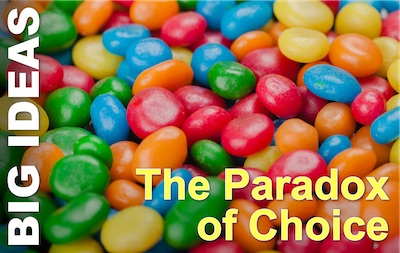

One is no choice at all. And two is a dilemma. Three is a poor choice. And four is a bit better. The more choices we get, the happier we are.
‘Not so fast‘ says Barry Schwartz. Beyond a certain point, more choices make us less happy. And that’s the paradox of choice.
Why does the Paradox of Choice Emerge?
More options is a good thing. That’s a fundamental tenet of Western society. It links to ‘freedom of choice’ – and freedom has to be a good thing, right?
So, look in any supermarket, under almost any category, and what do you find? A multitude of brands, price tiers, size options, and flavours.
The problem is, that too many choices make it harder for us to make our choice. And one of the reasons we find it hard to choose is our concern about what we don’t select.
If you choose wrong, you’ll regret your choice. So, too much choice leads to the fear of missing out*. And that’s the paradox of choice.
* In his book, Schwartz calls this fear of missing out, ‘FOMO‘.
What is the Paradox of Choice?
Too little choice constrains us. The Paradox of Choice is that, beyond a certain point, more choice does not make us happier. Barry Schwartz sets out this big idea in his 2004 book, ‘The Paradox of Choice – Why More is Less’. (US|UK). See what he does there? His subtitle is written as a paradox.
Definition of the Paradox of Choice
Schwartz even has a sub-subtitle: ‘How the culture of abundance robs us of satisfaction’. Now you have a working definition of the Paradox of Choice:
Abundance robs us of satisfaction
How does the Paradox of Choice Work?
Too many options make it hard for us to choose. Not only do we face a more complex decision, but we also start to face FOMO: fear of missing out. Schwartz refers to the too many options as ‘overchoice‘.
And, when we have made our choice, we start to feel decision regret. What if we made the wrong choice? This robs us of the pleasure associated with our choices.
It can get worse, though. (It always can, says Mike the pessimist). Because with decision regret can come self-blame. Not only did I make the wrong choice; but it was my fault. You can see where that can go…
Maximisers and Satisficers
It turns out that people have two strategies when making choices. And, in simple terms, one strategy leads to happiness, while the other easily leads to regret, blame, and misery. Oops!
Maximisers
Maximisers constantly try to make the very best choice. They want to maximise the value of their decision, and so are constantly researching, comparing, and analysing. Their final choice needs to be right. But not just right: the best possible decision. And, with enough research, it can be. But hold on… two problems:
- While the maximiser is busy researching the very best new TV set, others may be relaxing, and enjoying their new TV.
- And, once the maximiser makes that ideal choice, all is well until… The next day, when they see a new advert for another, better TV.
Is there a better way?
Satisficers
Schwartz says that better way is satisficing.
Satisficers know what they need, and accept the first choice that fully satisfies their needs. This can be a complex, technical set of requirements, or a simple trade off between a short set of preferences and cost or convenience. Either way, when satisficers are satisfied, they stop choosing, they select, and then they get on with enjoying their choice.
As Schwartz says:
The secret to happpiness is low expectations
How to Mitigate the Paradox of Choice
Schwartz offers a number of solutions to help us mitigate the Paradox of Choice. Many of them overlap, so I’ll select a few.
- Not surprisingly, you can be happier if you satisfice more, and maximise less. We tend to maximize in some areas of our lives; and satisfice in others. So it’s not that you don’t know how.
- Practise a sense of gratitude for what you have, to make you less conscious of what you don’t
- Stop comparing yourself to other people. Social comparisons (we used to call it ‘keeping up with the Jones’s’ in the UK) are toxic.
- Reduce your options. You can do this by setting yourself constraints (‘I’ll buy the best thing in this shop’) or by creating a short-list of items that satisfy your needs and priorities.
What is the Controversy about the Paradox of Choice?
A number of commentators have observed that some of the key experiments on which Schwartz based his ideas have not been repeatable. And new experiments seem to contradict the old. Isn’t that always the way with social and psychological science?
The upshot is meta-analyses (that is, composite data across many experiments) that fail to show a paradox of choice effect.
Schwartz counters strongly. His principal argument is that the paradox is domain specific, and we simply don’t understand which domains it applies in. He cites several strong examples of reductions in choice leading to more sales and happier customers.
And it certainly makes sense to me that people who are expert in a particular domain will be:
- More comfortable with a wider choice,
- Better able to make a solid choice and maximise, and
- More confident and happier in their selection
And Schwartz also argues that structured organisation of choices can also mitigate the overchoice effect. This suggests that experimental design is a crucial factor in the results the experiment sees.
What is Your experience of the Paradox of Choice?
We’d love to hear your experiences, ideas, and questions. Please leave them in the comments below and we will respond.
To learn more…
Here is Barry Schwartz, speaking about the Paradox of Choice at TED, in 2004.
